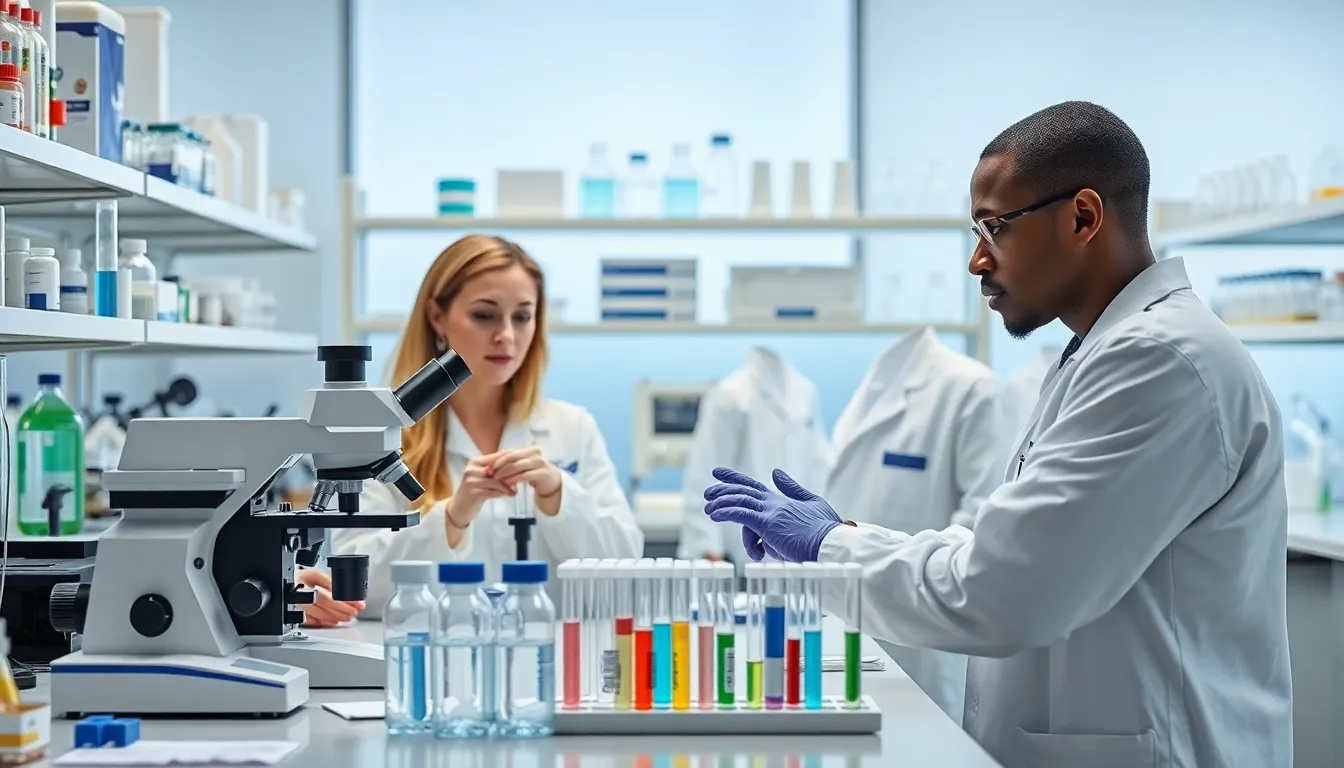In a world where science fiction meets reality, biotech labs are the unsung heroes of innovation. They’re the secretive hubs where brilliant minds concoct life-saving therapies and groundbreaking technologies. Imagine a place where petri dishes hold the keys to curing diseases and lab coats are the new superhero capes. Sounds enticing, right?
These labs aren’t just about test tubes and microscopes; they’re the breeding grounds for ideas that could change the way we live. From genetically modified crops to personalized medicine, biotech labs are pushing boundaries and making the impossible possible. So, buckle up as we dive into the fascinating world of biotech labs, where the future is being shaped one experiment at a time.
Table of Contents
ToggleOverview of Biotech Labs
Biotech labs serve as essential hubs for scientific innovation, focusing on the development of new therapies and technologies. These facilities contribute significantly to advancements within healthcare, agriculture, and environmental sustainability. Various types of biotech labs exist, each specializing in distinct fields such as molecular biology, biochemistry, and genetic engineering.
Research in biotech labs not only targets human health but also aims to enhance food production and quality through bioengineering techniques. Genetic modifications in crops increase resistance to pests and improve nutritional content, showcasing the labs’ broad impact on global food security. Personalized medicine represents another frontier, where tailored treatments emerge from patient-specific data, promising improved therapeutic outcomes.
Collaboration often defines the environment within biotech labs. Researchers partner with universities, government agencies, and private companies to maximize resources and knowledge. This synergy accelerates the pace of discovery, enabling the rapid transition of research findings from lab settings to clinical applications.
Funding sources vary and play a crucial role in advancing research agendas. Government grants, private investments, and venture capital provide essential financial support to drive projects forward. The competitive nature of the biotech sector encourages innovation and fosters a culture of continuous learning.
Biotech labs also navigate regulatory landscapes, ensuring that their products meet safety and efficacy standards set by authorities. Regulatory compliance not only protects public health but also bolsters consumer confidence in biotechnology applications. Overall, the work conducted in biotech labs significantly impacts society, driving progress that shapes future healthcare and agricultural practices.
Types of Biotech Labs

Biotech labs come in various types, each specializing in unique aspects of biotechnology. The diversity in lab types enhances the overall impact on healthcare and agriculture.
Research and Development Labs
Research and development labs focus on creating and advancing new biotechnology products and processes. Scientists conduct experiments to generate innovative therapies and diagnostics. These labs often involve teams of researchers working on molecular biology and genetic engineering projects. Through collaboration, breakthroughs occur, leading to significant medical advancements. For instance, researchers optimize drug formulation in specialized facilities to increase effectiveness. The outcome of this lab’s work can lead to patents and commercialization opportunities.
Clinical Labs
Clinical labs support the testing and analysis of biological samples from patients. They perform diagnostic tests and analyze results to inform treatment decisions. Typically, these labs operate under strict regulations to ensure accurate outcomes. Staff members, including clinical scientists and laboratory technicians, adhere to quality control protocols. Testing may range from blood analyses to genetic screenings. Validated tests provide essential data for healthcare providers, impacting patient care directly. Rapid results contribute to timely interventions, highlighting the lab’s role in managing health conditions effectively.
Key Technologies in Biotech Labs
Biotech labs leverage advanced technologies to push the boundaries of science and innovation across various fields.
Genomics and Proteomics
Genomics and proteomics form the foundation of modern biotechnology. Genomics focuses on analyzing an organism’s complete DNA sequence, which leads to insights about gene functions and relationships. Proteomics complements this by studying the structure and functions of proteins, vital for understanding biological processes. Both approaches enable scientists to develop targeted therapies, personalized medicine, and improved agricultural products. Technologies such as next-generation sequencing (NGS) and mass spectrometry advance these fields, allowing for high-throughput analysis and precise identification of genetic variations and protein interactions.
Bioinformatics Tools
Bioinformatics tools play a crucial role in managing and interpreting biological data. These software applications analyze complex datasets from genomics and proteomics, enabling researchers to identify patterns and relationships efficiently. Tools like BLAST and Genome Browsers provide powerful search and visualization capabilities. Data integration platforms allow seamless collaboration between researchers, enhancing the discovery of new biomarkers and potential therapeutic targets. As the volume of biological data continues to grow, bioinformatics tools remain essential for translating raw data into actionable insights that drive innovation in drug development and disease research.
Importance of Biotech Labs
Biotech labs are crucial for advancing healthcare and agricultural innovation. These facilities develop life-saving therapies and technologies that enhance human health and food security. They target global challenges, including disease prevention and crop improvement.
Advancements in biotech labs lead to personalized medicine and genetically modified crops, which ensure food quality and accessibility. Research and development labs create groundbreaking products, while clinical labs provide essential diagnostic services that directly impact patient care. Both types collectively contribute to significant medical breakthroughs and commercial opportunities.
Collaboration accelerates progress in biotech labs. Researchers partner with universities, government agencies, and private companies to share knowledge and resources, fostering innovation. This teamwork enhances the transition of lab findings into clinical applications, making solutions available to the public.
Funding plays a key role in sustaining research efforts. Government grants, private investments, and venture capital fuel research agendas, enabling the pursuit of novel biotechnology solutions. Navigating regulatory frameworks ensures the safety and efficacy of these solutions, which fosters public trust in the biotechnology sector.
Technologies like genomics and proteomics form the backbone of research initiatives in biotech labs. Genomics focuses on complete DNA sequence analysis, while proteomics examines protein structures and functions. Both areas are essential for developing targeted therapies and improving agricultural products. Advanced tools like next-generation sequencing and mass spectrometry enable researchers to conduct high-throughput analyses efficiently.
Bioinformatics tools further contribute by managing and interpreting vast amounts of biological data. Researchers can identify patterns and relationships, driving innovation in drug development and disease research. The impact of biotech labs on society is profound, influencing the future of healthcare and agriculture positively.
Challenges Faced by Biotech Labs
Biotech labs encounter several challenges that may impede their progress. Funding limitations often restrict research capabilities, hindering the development of new technologies. Regulatory compliance remains a significant hurdle, with rigorous guidelines that labs must navigate to bring products to market.
Competition in the biotech sector intensifies as innovative solutions emerge. Labs continually strive to stay ahead of rivals while ensuring the safety and efficacy of their discoveries. Intellectual property issues also present obstacles, particularly for smaller labs seeking to protect their innovations against larger companies.
Workforce retention poses another challenge. Recruiting highly skilled scientists and technicians becomes increasingly competitive, impacting the ability of labs to meet project demands. Additionally, cultural shifts within organizations could influence team dynamics and productivity, potentially affecting research outcomes.
Maintaining cutting-edge technology and equipment is crucial yet costly. Regular maintenance and upgrades demand financial resources that might not be readily available. Balancing operational budgets while investing in new technologies often presents a dilemma for lab managers.
Collaboration challenges may also arise due to varying objectives among stakeholders. Aligning the goals of researchers, investors, and regulatory agencies may complicate project execution. Communication barriers in multidisciplinary teams can lead to misunderstandings, further complicating the research process.
Lastly, ethical considerations in biotechnology frequently generate debate. Public concerns over genetically modified organisms and their impacts on health and the environment require careful navigation. Gaining public trust becomes essential for the success of biotech initiatives, compelling labs to engage in transparent practices and effective communication.
Future Trends in Biotech Labs
Biotech labs will likely see significant advancements in automation and artificial intelligence. These technologies enhance efficiency and precision in research and development processes, reducing human error. Researchers increasingly implement AI algorithms to analyze complex data sets, speeding up discovery timelines.
Personalized medicine is becoming more prominent as labs focus on tailoring therapies to individual genetic profiles. Stakeholders prioritize this approach to improve treatment effectiveness and minimize adverse effects. As a result, targeted therapies are gaining traction in various fields, including oncology and rare diseases.
Sustainability initiatives also shape the future of biotech labs. Green biotechnology is on the rise, emphasizing environmentally-friendly practices in product development and agriculture. These methods reduce waste and promote the use of renewable resources, aligning with global sustainability goals.
Additionally, gene editing technologies like CRISPR continue to evolve. They offer new possibilities for addressing genetic disorders, enhancing crops, and developing innovative solutions to pressing health issues. Efforts to refine these tools aim to ensure precision and minimize unintended consequences.
Moreover, collaboration among multidisciplinary teams is expected to increase. Researchers, ethicists, and regulatory experts work together to navigate the complexities of biotechnology. Such partnerships enhance innovation and address ethical considerations, fostering public confidence in the science.
Investment trends reflect growing interest in biotech, with venture capital funding directed toward promising startups. The influx of resources supports ambitious research projects and helps bring groundbreaking therapies to market. As competition intensifies, labs prioritize staying ahead through cutting-edge research and technology adoption.
Future trends in biotech labs reveal significant advancements through automation, personalized approaches, sustainability, and collaboration. These elements collectively drive the sector toward innovative solutions addressing global health and environmental challenges.
Biotech labs are at the forefront of scientific innovation and societal progress. Their contributions to healthcare and agriculture are reshaping how we approach disease treatment and food production. As they navigate challenges like funding and regulatory compliance, the potential for groundbreaking discoveries remains immense.
The evolution of technologies such as genomics and artificial intelligence will continue to enhance research capabilities. With a focus on sustainability and personalized medicine, biotech labs are poised to address pressing global issues. The future of biotechnology looks promising as collaboration and investment grow, paving the way for solutions that benefit both humanity and the environment.




